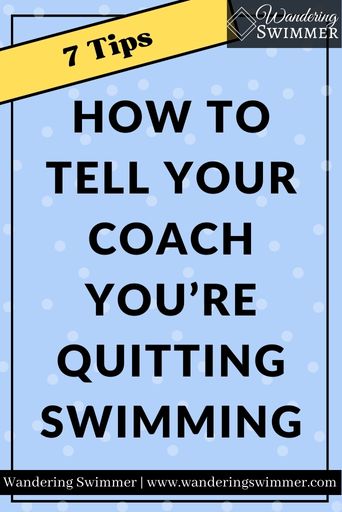Some mornings, it’s tempting to dream about how you would tell your coach you’re quitting swimming. But when that dream turns into reality, you may find it daunting to have that conversation with your coach.
Related article: Is Quitting Swimming the Right Thing to Do?
And that’s understandable! It’s not an easy conversation and it’s one that you shouldn’t rush into.
Not sure what to say or where to start? We have 7 tips for how to tell your coach you’re quitting swimming. Along with three examples that you can use.
Disclosure: This post may contain affiliate links, meaning we earn a small commission at no cost to you if you purchase something through one of our links. As an Amazon Associate, we earn from qualifying purchases. Please check out our disclosure page for more information.

Why Should You Tell Your Coach You’re Quitting?
It’s tempting to avoid letting your coach know that you’re leaving the sport. You can skip the awkwardness along with a variety of other emotions that would come from the conversation.
However, you should let your coach know that you’re quitting the team even if you’re not looking forward to the conversation.
Telling your coach you’re quitting swimming is not only the right thing to do but may be required for some teams. It can also:
- Avoid burning bridges
- Shows respect to your coach (even if they don’t deserve it)
- Let’s you leave on good terms
Your coach(es) also cares for you and when you stop showing up to practice, they’ll wonder if something happened. Especially if you stop answering calls or texts, or they can’t get ahold of you.
It’s also discourteous to leave without any warning or explanation. Give your coach the courtesy of a heads-up before quitting.
How to Tell Your Coach You’re Quitting Swimming
Let’s face it, there’s no easy way to have this conversation. It can be awkward and not every coach will take the news with good grace.
No one script or approach fits everyone. You’ll have to tweak certain parts and adjust for how your coach is.
When it comes time to tell your coach you’re quitting swimming, here are some aspects to consider that can make the conversation a bit easier.
Be Direct and Upfront
If you’re like me, you dislike awkward conversations and would rather avoid them. And if you can’t avoid them, it’s hard to state directly and clearly what you need to say.
When telling your coach that you’re quitting the sport, it’s best to be direct and upfront. Don’t try to stall or drag out the reason. It only makes things even more uncomfortable.
Related article: 10 Things to Consider Before Quitting Swimming
Instead, take the direct approach. Start the conversation directly with ‘Coach, after a lot of thought and consideration, I’m ready to quit swimming. X date will be my last day/practice.’
If that’s too direct for you, you can also try the ‘Oreo Cookie Approach’.
This method of having difficult conversations works where you sandwich ‘negative news’ (aka the filling) between two pieces of ‘positive’ news (aka the cookie). This can help the conversation seem less direct and harsh.
An example could be:
- First Cookie: I wanted to say thanks for all that you’ve done for me during my time swimming with you. I really appreciate it.
- Filling: But I think I’m ready to move on and try something new in my life that’s not swimming. I’ve thought about it for a while now and I’m planning on my last day with the team to be X date
- Second Cookie: I’m excited to start this new part of my life and I wouldn’t have the independence or discipline that you helped me grow. I’m proud to have swam with you for all these years and I know the team will only keep growing/doing well.
It may seem a bit more flowy and less direct, but it still gets the point across. And may be better received than an extremely direct approach. You know your coach the best though. Pick which option you think will work best for them.
Prepare for Various Emotions
Now comes the second awkward part, dealing with their response. And by their response, we mean their emotions.
Some coaches run hot-headed and may not take the news well. Especially if you’re a high-performing athlete. These coaches may take it personally and get angry that you’re leaving.
They may also turn sarcastic or snappy, trying to twist your words. Just as they may refuse to listen to what you have to say.
It’s unfortunate if this happens as you’re more than an athlete or their star performer. The best you can do is try not to take anything they say personally.
Related article: 8 Tips to Tell Your Parents You Want to Quit Swimming
Have someone with you if you feel that your coach might act negatively or even violently toward your news. Or even better, consider telling them in an email if you feel they lash out when you give them the news. Your safety is important.
Your coach may also express their disappointment or that they’re sad to hear of your decision. Which is understandable but shouldn’t be used as a means to sway you to stay.
Our advice is to avoid apologizing at any point.
Yes, you can feel bad for leaving. But coaches know that on any given day, a swimmer can decide to leave. And ultimately, it’s your decision and they need to respect that. Don’t let them guilt you into staying when you don’t want to.
Remind them that this wasn’t an easy choice (even if it was) and that you appreciate all the time and effort over the last few years.
Lastly, some coaches take the news with grace. They’re sad to hear the news, but they’re also encouraging and supportive.
We hope that your coach will lean this way when you tell them you’re quitting.
Answer Questions
More than likely, after you tell your coach you’re quitting, they’ll have some questions about your decision to leave.
For some, this is another awkward part of the conversation that you’d rather avoid. Especially if your coach asks why you want to leave and if you’re sure about your choice.
Some questions that your coach may ask you are:
- Why are you quitting?
- What brought on your decision to quit?
- Have you thought this through and what it will mean for your future?
- You have so much talent. Are you sure you want to quit?
- Are you open to other suggestions?
The questions your coach may ask will vary by team and circumstance. In some cases, your coach truly wants to understand your decision. In other instances, they may be probing in hopes to make you second guess your choice.
More Content for You: A Swimmer’s Review of Arena’s Team Line Parka
Again, we recommend not apologizing for your decision. Anticipating the questions your coach may ask and preparing how to answer them can make it easier to avoid feeling guilty or getting caught up in why you shouldn’t quit.
However, we also suggest that if you’re not 100% certain you want to quit, keep an open mind.
Your coach may have a suggestion for you to try that may work better for you than quitting. Such as reducing the number of practices or taking some time.
Acknowledge Their Effort
Even if your coach wasn’t the best in the world or you felt they didn’t develop your skills as they could’ve, acknowledge their effort.
Coaches put in a lot of hours at the pool and developing workouts for the team. Yes, it’s part of their job but even a small nod towards their work can go a long way during this conversation.
As mentioned earlier, this can play out naturally with the Cookie approach. You’re not trying to butter them up or inflate their ego. Nor do you need to lie if they’re an awful coach.
Instead, you’re just thanking them for their coaching efforts and the time spent at the pool with you.
While telling your coach you’re quitting, receiving gratitude can take away the sting and make it seem less personal towards them.
Thank Them For Their Coaching
Just as you should acknowledge the effort they put into coaching, you should also thank your coach.
Thank them for everything they’ve done and for helping you grow as a person. Even if they were a bad coach, you still learned something from them. Mainly how not to act!
If they’ve been a good coach though and you’ve grown/developed under their coaching, be sure to let them know how much you appreciate their dedication. And acknowledge that they helped you get to where you are now because of their coaching.
Related article: 8 Awesome Gift Ideas for Swim Coaches
Again, you’re not trying to suck up. You’re simply thanking them for the things that they’ve done. From long practices at the pool to even longer hours at swim meets.
Swimmers tend to see our coaches almost as much as we see our parents daily. They’re in your life more than you realize and play a large role in your life.
Be Respectful
Above all, be respectful. Yes, even if your coach is awful and you hate them.
Being polite and respectful can go a long way when delivering negative news to someone. And it also speaks to your person when you present yourself in a positive, respectful manner. Even if your coach doesn’t deserve it.
More Content for You: 6 Best Prescription Goggles for Swimming + FAQ
Don’t go into the conversation ready to curse them out and tell them how bad of a coach they are. If they ask for feedback, know how to give constructive criticism so you don’t come off as being rude.
Ask Questions
Just as your coach may ask questions, you should also ask questions. It’s important to know what your team’s policy is to leave the team.
You may need to stay with the team for a certain amount of weeks following your news. Or you may have some outstanding fees/dues that need to be paid.
Related article: 8 Things to Do Before Quitting Swimming
You and your coach can map out what the rest of your time on the team may look like. And how you plan to let your teammates know.
This is especially important if your decision to quit swimming leads to a loss of scholarship or a change in your school schedule.
We recommend that you write out any questions you have before your conversation so you don’t forget them.
Examples to Tell Your Coach You’re Quitting
It’s not easy to draft how you’re going to tell your coach you’re quitting swimming. You may have a lot to say and it can get jumbled around in your head.
To help you get started, we have a few examples of how to tell your coach you’re quitting the sport. Pick the parts that you like to make your own dialogue. Or take the whole example!
More Content for You: End of the Swim Season Checklist
We suggest that you rehearse what you’re going to say before meeting with your coach.
Practice it with others to help you get a better feel for the conversation. They may also give you feedback and can help prepare you for various questions that may be asked.
Sample One
Coach, after much thought and consideration, I’ve decided that I’m going to quit swimming. The last X years have been a great experience for me and I’m thankful for all that you’ve done for me during that time.
But I’m ready to move on and try something new. I’m excited to see what else there is for me beyond swimming and what I can achieve outside of the sport. I know that everything I’ve learned here will help me in the future.
Sample Two
This hasn’t been an easy choice for me but based on my current attitude towards swimming, I think it’s in everyone’s best interest if I stop swimming.
The last few months have been challenging for me mentally and physically, and I need to take care of myself first. I know swimming will always be there but it’s not the best for me right now.
I can’t thank you enough for all your years of guidance and coaching. You and the team mean a lot to me, and I’ll take those memories with me. But I need to do this for me and I hope you can understand my decision.
Sample Three
Coach, I’m done swimming. I can’t keep swimming anymore because I’m not finding the joy/love for the sport. Please understand that it’s nothing personal but I’m just ready to move on to another chapter in my life.
I’ve thought about this for several days/weeks now and I know it’s the right decision for me. I want to thank you for all the time and effort you put into coaching me, and for helping develop me as a person.
In Closing
There’s no easy way to tell your coach you’re quitting swimming. But keeping swimming when you’re not happy isn’t the best option either. And while it may be uncomfortable to have this conversation with them, you have to do what’s best for you.
Best of luck!
Chevron
Bonus Content
Your Swim Team Overview: A swim team in principle seems simple. But like anything, it has its many quirks, terms or jargon, and various facets that can make it confusing. Here is a brief overview of all swim team related items to help you get started
What is a Swim Team? Ask any swimmer and they’ll say a swim team is more than just swimmers. Being on a swim team is dedication, support, and mentorship.

Want to Improve at the Pool?
Join swimmers and swim parents to receive my free newsletter and receive a free Swimming Glossary e-book as a thanks!
Every month you’ll receive tips and coaching to help you find success at the pool.
About

Chevron is a current competitive swimmer with almost 20 years of experience in the pool. And although she fell into the sport by accident in her high school years, she still trains daily and competes throughout the year. She’s committed to providing guidance to all levels of swimmers and believes that everyone should know how to swim.